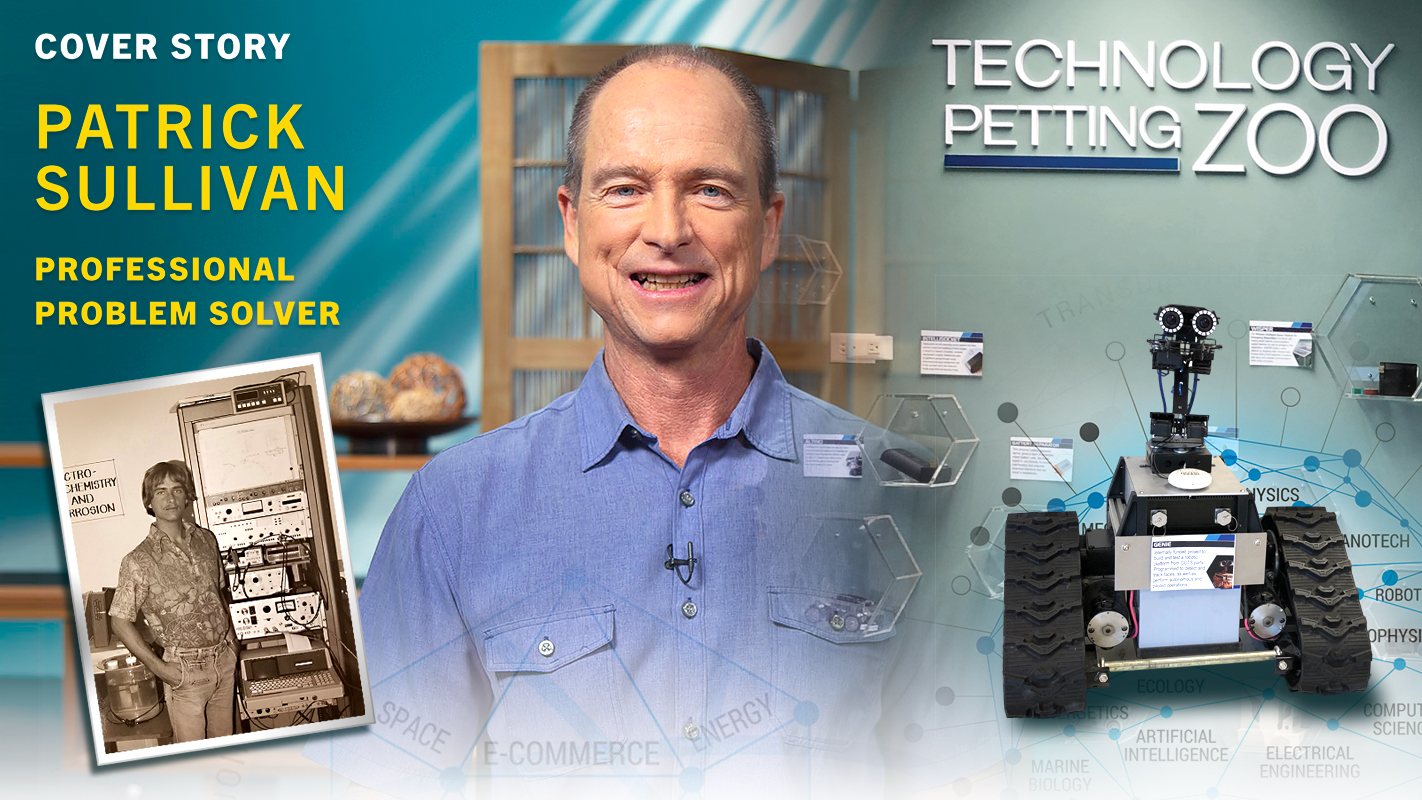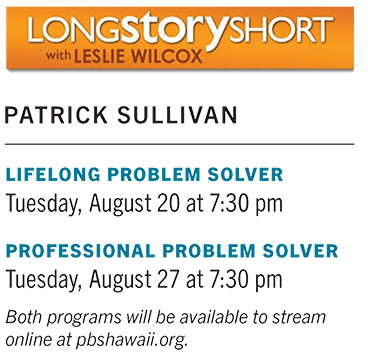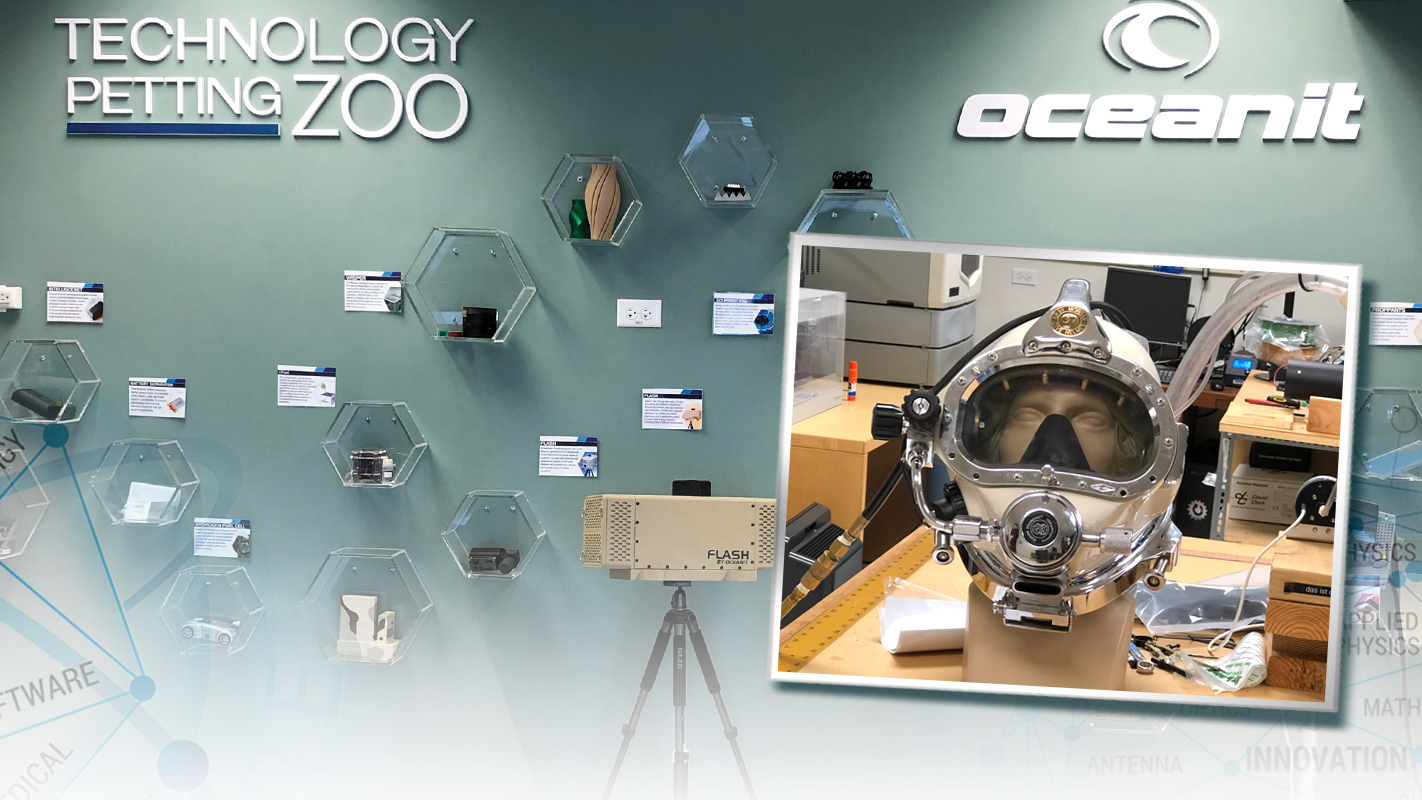The PBS Hawaiʻi Livestream is now available!
PBS Hawaiʻi Live TV
By Liberty Peralta, PBS Hawaiʻi

Inset image, left: Sullivan as a University of Hawai‘i doctoral candidate in Engineering. Genie, right, is an Oceanit robotics and artificial intelligence project with two brains, eyes, ears and a mouth that is capable of tracking faces and specific expressions.
 It seems there’s no problem too big or too small for Patrick Sullivan of Kailua, Windward O‘ahu.
It seems there’s no problem too big or too small for Patrick Sullivan of Kailua, Windward O‘ahu.
He wanted a car, so at age 13, he started working in food service jobs, saved up and bought a car at age 16.
He wanted to go to college, so at age 17, he applied for student loans, grants, and work study … and started a landscaping business to earn the money.
He visited the Islands during a college break, so to pay for his lodging, he cobbled together home improvement jobs for some people he met on the plane ride to O‘ahu.
So it seems natural that Sullivan is now in the business of problem solving. He’s the founder and chairman of Oceanit, a Honolulu-based company that uses science and innovation to create solutions to some of the world’s biggest challenges. One of the many projects that Oceanit is working on is a rapid-response solution to help an elderly person after a fall. Sullivan explains that an “inexpensive but effective robotic assistant” can help save a life.

This wall at Oceanit headquarters attracts visitor attention. Inset image: Deep-dive helmets, above, are being redesigned to reduce noise that causes hearing loss while maintaining the ability to communicate.
The name “Oceanit” comes from a Greek and Latin term for “ocean dweller.” It’s an apt description for Sullivan, who gets in the water four to five times a week. It’s a tradition that started when his son Matthew and daughter Tarah were children. “Surfing is a way to reconnect to the world,” he says.
As Sullivan explains it, “Oceanit” is also an apt company name. “The ocean is a teacher in so many ways,” he says. “It covers everything from physics, chemistry, biology, hydromechanics, so [the ocean] is probably the biggest mashup of all science.”
Oceanit employs about 160 scientists and engineers and has raised more than $475 million in research and development funds. Its national and international client list includes governments, universities, organizations and businesses.
It’s no accident that Oceanit is based in Hawai‘i, and Sullivan credits it as a strength. “Innovation comes from differences, not sameness,” he says. “I think in the culture of Hawai‘i is innovation. The Native Hawaiians that came to Hawai‘i, they innovated to get here, and they innovated when they got here. They were not afraid of technology, afraid of change; they embraced it.”
Sullivan is familiar with constant change. Born in California, Sullivan spent his early years in Los Angeles. His family moved to Seattle after his father Thomas was hired as an aircraft mechanic for Boeing, a job that would end during a mass layoff. Sullivan’s family then moved multiple times to Texas, Wyoming and Arizona, before settling down in Colorado.
“I went to four different high schools, which brings its own challenges,” Sullivan says. “[My parents] tried to keep everything together, but it was just really hard.”
His parents, whose families moved West after the Great Depression, lacked the means to pursue an education, and had five children to care for. “That’s why an education was so important [to me],” he says.
With the rapid pace of technology replacing lowerwage service jobs, Sullivan underscores the importance of education.
“Adults need to consider lifelong learning,” he says. “That needs to be part of the culture, where we get comfortable with that, and it needs to be more available and affordable.”
Sullivan stresses that getting an education for the sake of education isn’t the point, but to build one’s “durability” as industries continue to evolve. It’s the kind of durability that’s helped Sullivan navigate change and tackle life’s challenges.
And with the business of problem solving, it seems there’s no end in sight.
